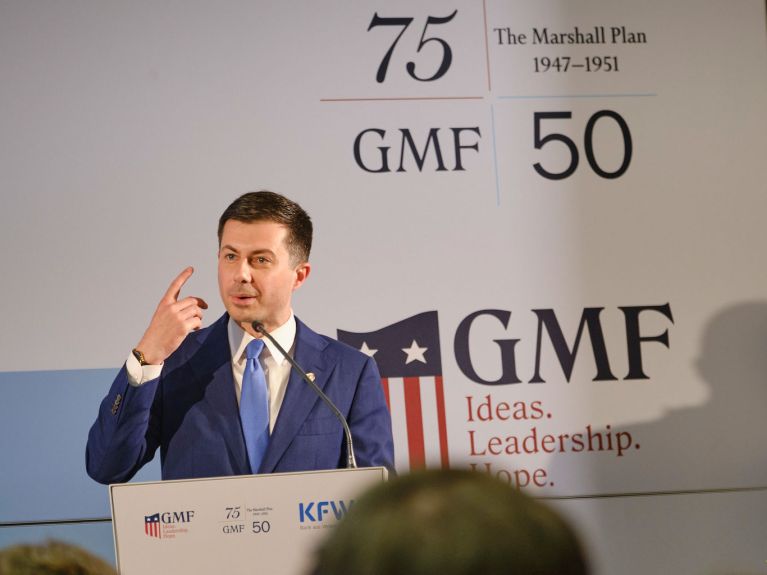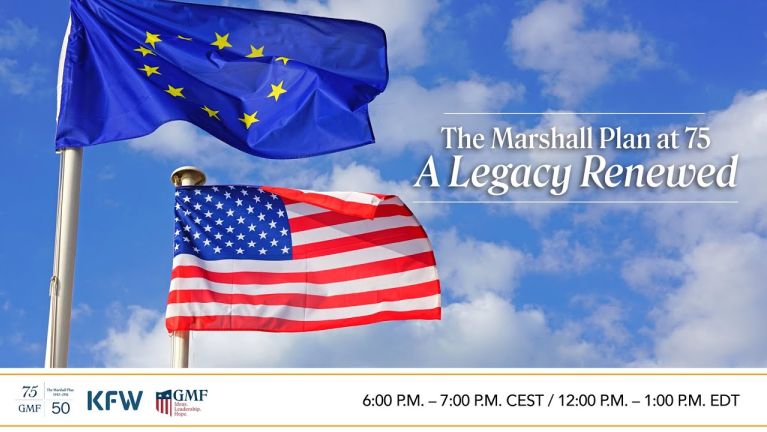A plan for democracy
75 years of the Marshall Plan: How Germany benefitted from America’s support – and how this exchange for democracy is to continue.

It is a double anniversary that is being celebrated on both sides of the Atlantic in 2022: 75 years of the Marshall Plan and 50 years of the German Marshall Fund are signs of a special connection between the US and Germany. It all started with a speech given by the then US Secretary of State George C. Marshall at Harvard University on 5 June 1947, in which he announced a sweeping programme of financial assistance for Europe. It was not only economic development that the US wished to boost, however. As German Finance Minister Christian Lindner stressed at an event to mark the 75th anniversary: “The aim was to construct the institutions necessary for political and economic freedom and for a free society.”
Dieses YouTube-Video kann in einem neuen Tab abgespielt werden
YouTube öffnenThird party content
We use YouTube to embed content that may collect data about your activity. Please review the details and accept the service to see this content.
Open consent formWhat does the Marshall Plan mean for Germany’s democracy?
The condition tied to the European Recovery Program (ERP), as the Marshall Plan is officially known, was that European countries should agree on a common competition-based economic order. This laid the foundation for European unity, a transatlantic partnership and a set of shared values. Germany, the former wartime enemy that was now occupied by the Allies, became a partner. Taking stock, political scientist Hubert Kleinert remarks: “After the desire in the early years of the occupation regime was to keep Germany’s economic basis as small as possible so as to prevent Germany posing any renewed risk to its neighbours, the idea now was for American money to facilitate its economic upswing with a view to preserving Europe from communism.”
Dieses YouTube-Video kann in einem neuen Tab abgespielt werden
YouTube öffnenThird party content
We use YouTube to embed content that may collect data about your activity. Please review the details and accept the service to see this content.
Open consent formWhat does the German Marshall Fund do?
The German Marshall Fund was created by a gift from Germany in 1972; it was also a symbol of thanks for the huge support provided by the Marshall Plan. The German Marshall Fund of the United States has its headquarters in Washington, but also maintains offices in Berlin, Brussels, Ankara, Belgrade, Bucharest, Paris and Warsaw. It organises exchange on central transatlantic topics ranging from everything from the future of democracy and questions of security policy and geopolitics to digitisation and technical innovations. An online format on 21 and 22 June 2022 for example will be exploring the challenges of migration policy in the digital era. At the end of June, the annual high-level “Brussels Forum” will be held in the Belgian capital, addressing the most urgent global challenges, especially the war in Ukraine.
Is a new Marshall Plan needed?
As recently as May 2022, the Ukrainian President Volodymyr Zelenskiy called for a “modern Marshall Plan” for his country, to provide comprehensive financial assistance but also involving “greater participation by the free world and the international institutions”. Though the prerequisites for the 1947 Marshall Plan were entirely different, the idea of far-reaching support that facilitates not only economic reconstruction appears timeless. In 2017, for instance, Germany set in motion a “Marshall Plan with Africa” under the umbrella of the G20’s “Compact for Africa” initiative. And when Germany’s new Finance Minister Christian Lindner talked in May 2022 about the major anniversary, US Secretary of Transportation Pete Buttigieg joined him in paying tribute to this special legacy. He stressed: “Maybe the most important thing we have in common with our forebears 75 years ago is a consciousness that the future for liberal democracies is not guaranteed.“ It is clearly worth preserving memories of the Marshall Plan.




